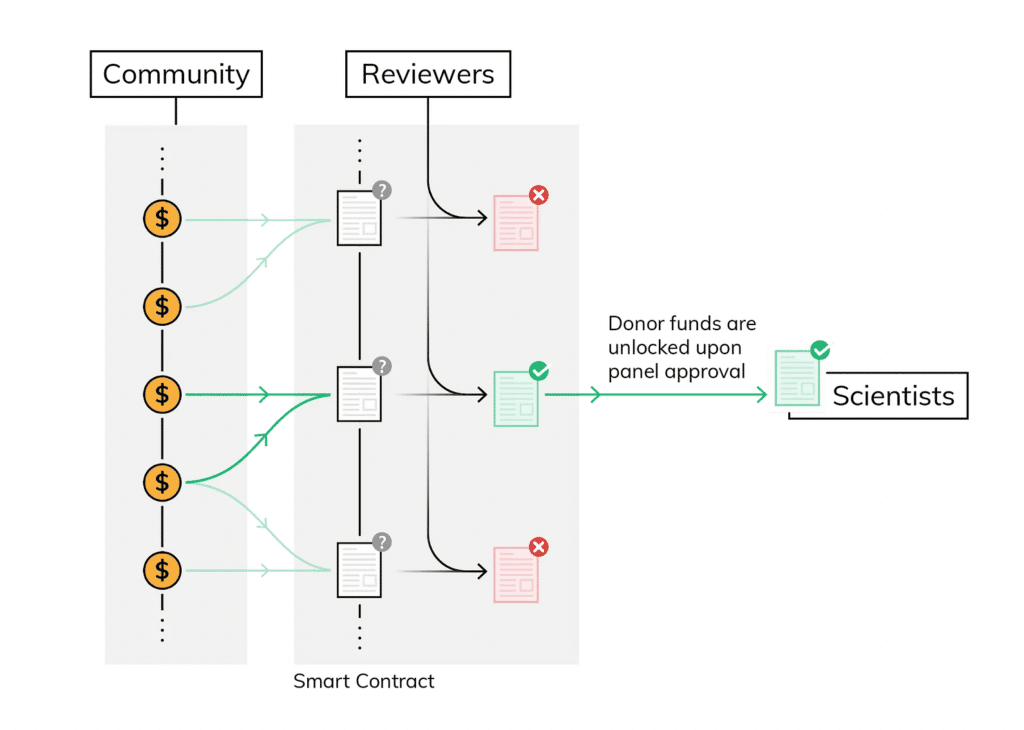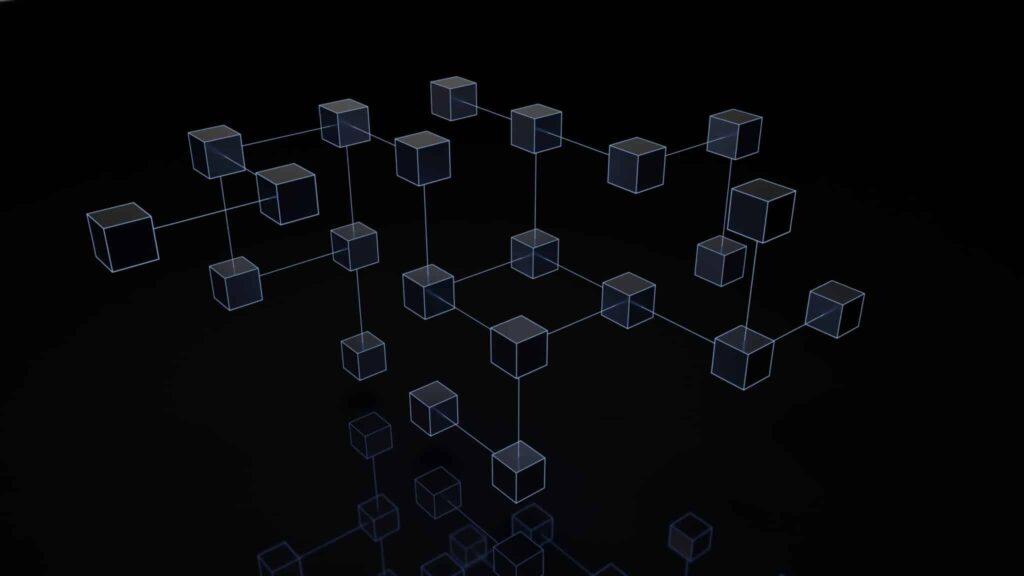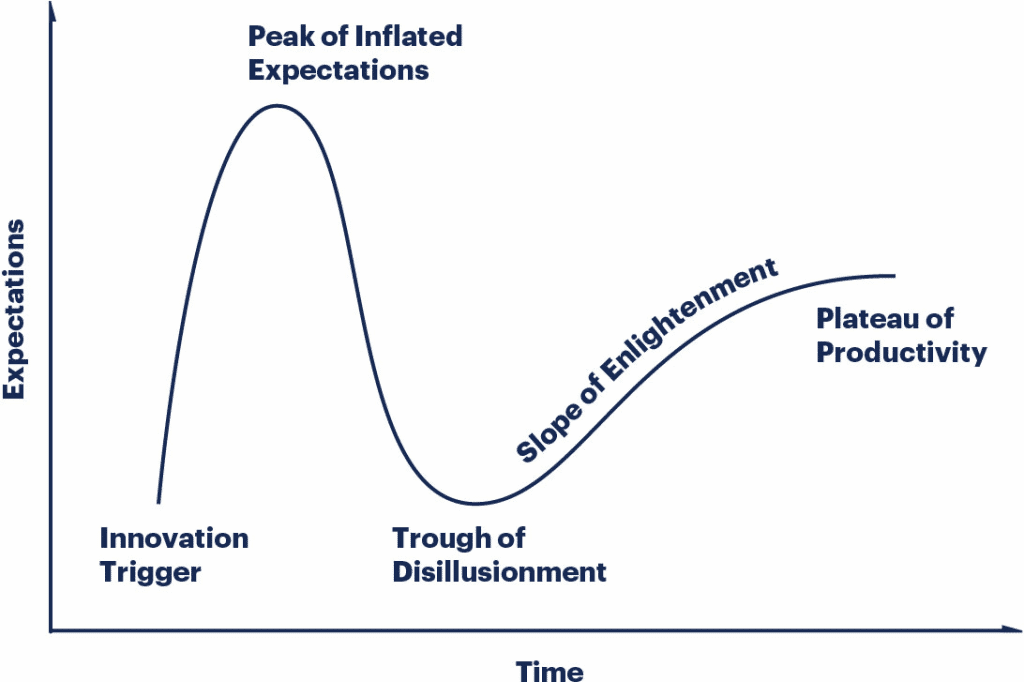
Can Blockchain Revolutionize the Scientific Process?
In terms of promise and success, blockchain technologies have been all over the map this year. Use cases for the arts have flourished, and new platforms allowing things like NFT trading for theater fans have emerged. Cryptocurrency, blockchain’s original purpose, has been on some big rollercoasters—most recently culminating in the collapse of crypto exchange FTX, which is likely to affect the whole industry. Meanwhile, the less sensational sub-category of smart contracts has held out as a useful and relatively stable application.
Blockchain, which uses a distributed ledger system of record-keeping, is a foundation for the decentralized Web3 that’s still feeling out its place in the digital world. This emerging ecosystem seems to be volatile, but there’s still a lot of potential in it that many people across different industries are excited about. In particular, proponents and innovators want to see a decentralization of processes that could lead to greater efficiency, transparency, and fairness. Science and academia are areas where this could make a big difference from current practices, where research publication is a difficult and lengthy affair. Could blockchain revolutionize the scientific process?
Decentralizing Science
Scientists interested in using blockchain for an open scientific marketplace envision a decentralized system of research collaboration and publication—a place where scientific exchanges of information happen without the the encumbrance of profit-seeking overseers like scientific journals. Following the lead of DeFi’s decentralization of finance, a DeSci movement has come about with its own goals of creating this more level ecosystem. Key principles of this movement revolve around open access and fairness:
- Scientific knowledge should be accessible to everyone.
- Scientific work should be given fair credit and incentivized in appropriate ways.
- Collaboration and transparency should be embraced.
- Patients and consumers should be able to own and control their medical data.
As the scientific publishing process currently stands, researchers conduct studies and submit them to journals for publication. In order to publish, they must impress publishers with findings that are marketable: a study with positive results or with more element of novelty fares better than one that disconfirms a hypothesis or does necessary repetition to check a similar study. Those latter types of research are also crucial for a full and well-tested understanding of the scientific subject, though. So researchers are compelled to prioritize work that is publishable over that of high quality and scientific rigor.

Papers also need to pass a peer review process that relies on volunteers in their field—these volunteers, busy themselves with the need to get their own research out, can take months or even years. All the while, universities are demanding continual publications with high impact factors from their professors. The result is that science researchers are pressured to frequently produce papers through an inherently slow, discriminating process. Then, once a paper is finally published, it’s expensive for anyone who wants to read it.
Decentralizing the way studies are shared could modernize this information flow. DeSci’s vision is to create a space for researchers to publish in a more immediate and fluid way, where open access allows for multiple peer reviews and updates over time—a better reflection of the way science actually works, as opposed to a finished paper set in stone. It could break down the wall between the science community and the general populace, a demolition that desperately needs to take place amid today’s scientifically uninformed masses and the consequences thereof.
An Improved Funding System
One of the biggest problems in science today is the issue of funding. When it comes to publications, scientists don’t get paid for their articles, but journals typically charge around $30 for a reader to access a paper, or journal subscriptions can range from a few hundred to several thousand dollars. This adds up quickly for inquiring minds—and discourages those outside the field from inquiring. A current alternative to this is the option to publish in open access journals, but then the authors themselves have to pay to publish their papers—typically a few thousand dollars each time, which is hardly desirable.
Even before publication, the research itself has to get funded. The costs of running labs and conducting research aren’t small, and university professors are generally expected to come up with their own grant money to pay for them. Therefore, they end up spending huge amounts of time applying for competitive grants, most of which they won’t receive. It becomes a major time suck and a big impediment to the actual work researchers want to do.

An alternative that blockchain enables is a system where a combination of private, public and crowd-sourced funds could be conditionally transferred through smart contracts: donors who want to support a proposal can submit funds, which are held until a peer review of the proposal is done. If the project successfully passes this review, the funds will go to the researcher; if it doesn’t, they automatically go back to the donors. Quadratic funding and matching pools can boost the monetary amounts in these scenarios.

Incentivizing Peer Review
Where will these reviewing peers come from? Since peer review today is typically done on a strictly voluntary basis, those asked to do so may take their sweet time with it or refuse the task in the first place. To correct for this lack of motivation, some have suggested using the blockchain ecosystem to create incentives for fellow scientists to take part in that process. Whether for funding review or peer-reviewing papers, a token-based system could be set up so that reviewers are rewarded in a continuous manner.
For example, an author publishes a paper and gets a non-fungible token (NFT) certifying her ownership of it; a reviewer submits his review of the paper; and another scientist later cites the paper. The distributed ledger records the hashes of each of these related efforts and tokens are automatically given to each of the people involved. As the paper is engaged with more over time, it truly becomes a chain of blocks linked together in ongoing connection, with credit attributed to each participant along the way. It becomes almost like a living ecosystem of growing knowledge that connects all who have been a part of it.

What Does a Blockchain-Based DeSci Environment Look Like?
One way that this new DeSci structure is manifesting is in Decentralized Autonomous Organizations (DAOs), which are essentially community clubs where members contribute, vote, etc. in an area of interest or focus. It can be compared to a more decentralized society itself, like that of America’s earlier days when direct civic membership in smaller groups meant wider participation and thus, arguably, stronger democracy. That’s a big part of what Web3 is all about, centuries later: a democratized space where participants have more control and are less reliant on powerful intermediaries. So, in the case of scientific publications, rather than bowing to journal publishers that direct the course of study and charge a hefty fee for access to published papers, DAO members would contribute small membership fees to keep things running and publish work that people can access for free.
Will Blockchain Revolutionize the Scientific Process?
According to Gartner’s Hype Cycle for Blockchain and Web3 in 2022, much of this—decentralized exchanges, NFTs, blockchain and tokenization—is on a downward slope of disillusionment. (If you’re not familiar with Gartner’s hype cycle chart, it’s a pretty interesting diagram of the path that new technologies tend to traverse in terms of public excitement about them.) Web3 technologies are still new enough that we can’t be certain where they’ll end up, and to what extent they might rise out of that trough of disillusionment.

But while blockchain’s hype may be falling, its potential is still just beginning—these possibilities for science can easily extend to other areas of academia, or drug development for medical uses: similar to the bogged-down academic publishing process, clinical drug development is currently slow and costly, and lower-profit areas like rare diseases don’t receive enough focus. If these processes can be improved through the decentralized vision of blockchain’s proponents, then science and many other fields really will be revolutionized.
